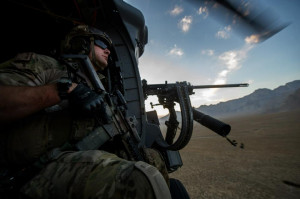
At the same time there’s another group of troops currently deployed in Afghanistan – the so-called Coalition Forces. They entered Afghanistan in 2001 during the “Enduring Freedom” operation in the aftermath of 9/11 to cleanse the Afghan soil of any Al-Qaeda presence and to bring the Taliban regime down. Those forces don’t have any sort of legitimate excuse for being in Afghanistan today, except for the UN article number 51 that says that countries are allowed to defend themselves in case of military aggression against them. At the same time Washington doesn’t provide any kind of information on the numbers of these troops, but according to certain sources the number of soldiers stationed under the CF banner is estimated to be around 30 thousand, even though CF are not solely composed of American soldiers.
The White House plan of withdrawal says that all the foreign troops are to leave Afghanistan by 2014. Before leaving they should hand over all of their duties to the local police and military forces that have already received a proper training by the NATO instructors. The total amount of people employed in these departments of security reaches 350 thousand mark. But the events of the recent months have showed that neither one of these forces can maintain order in their respective areas of responsibility. Their incapability to wage modern warfare on their own, the lack of tactical planning have resulted in the rapid growth of terrorist activity in the regions that were handed over to them by the International Security Assistance Force. As a result the initial level of desertion among the policemen and soldiers hovered at 30%, but it reached 50% pretty soon, with deserters taking the Taliban side with the weapons and vehicles that were just presented with.
At the same time the US authorities are not afraid to admit that they’re leaving around 8 thousand of instructors behind in order for them to prepare new policemen and soldiers for carrying their professionally duties, along with giving a helping hand to the locals in the tactical planing domain. Additionally they’re leaving 4 thousand SOCOM soldiers until 2017 at best. Those soldiers should interfere if the situation in Afghanistan gets out of hand, especially in Kabul. If the local authorities are to flee in the face of danger and policemen and local soldiers are to take the Taliban side, SOCOM will be the last line of defense preventing the new regime from falling. And despite the fact that the NATO plan of creating a peaceful Afghanistan implies that the new authorities and their Western sponsors are to reach an agreement with Taliban, they fail to do so, since they are trying to negotiate with Taliban representatives in the luxurous Persian Gulf hotels.
In such a situation, NATO and Washington is still going to spend staggering amounts of money in Afghanistan even after leaving it. The spendings will be allocated among the local police and army training, government structures redevelopment, economic rehabilitation of the economy and fights against the drug traffic. It seems that in the years to come the United States are not going anywhere. The expenditure on the Afghan National Security Forces alone will amount for 4 billion dollars. The better part of this sum (60% to be precise) comes from the United States, say nothing about tens of billions of dollars that are going to be spend to save the U.S. military presence in Afghanistan. Why should one embark on such a trip? The years of occupation were particularly cruel to Afghanistan. Today it’s a state with no economy whatsoever, except for the drug market that is blossoming and the natural resources are too expensive to extract and to ship in the present conditions. The population of Afghanistan has reached a 30 million people mark, but all those people are not living, they’re surviving. Who is going to feed all those people? In comparison, the U.S. has given up on Iraq with its vast natural resources and the infrastructure for shipping. Yet, they decided to leave Iraq and stay in Afghanistan.
Is there any logic behind all this, there’s certainly in As the occupation of this country moved on, Washington authorities along with a number of “locally deployed” officials have established strong criminal ties so that they could profit from the troublesome state this country has found itself in. They siphoning off the US and NATO money that were intended to rebuild this county. Most exprets are clever enough to keep silent and say nothing about the fact that 8-10 trillion dollars spent on this war would be enough to make a prosperous, blossoming country out of Afghanistan. But the situation is even worse than that, since nobody really know how much money were spent in this war.
But truth be told, there’s no real war in Afghanistan, in comparison to Syria or Iraq the number of explosions and firefights that take place in Afghanistan is pathetically low. For this reason the NATO forces are peacefully living on their bases (there’s more than 300 of them, scattering across the country), sometimes they decide that they should pay a visit to their friends from the neighboring base or to some official in order to show some activity. The Taliban is not in a hurry either. It stays away from Kabul, passionately waiting for the day when they have more forces to take it. But can one blame them – they’re living a prosperous life in the country, with money flowing from the corrupted U.S. officers and the Gulf states at the same time.
The U.S. officers have no reasons not to become drug barons, especially if somebody considers the fact that they have hellis at their disposal.
Alexander Orlov, political analyst and an expert Orientalist, exclusively for the online magazine “New Eastern Outlook”.
